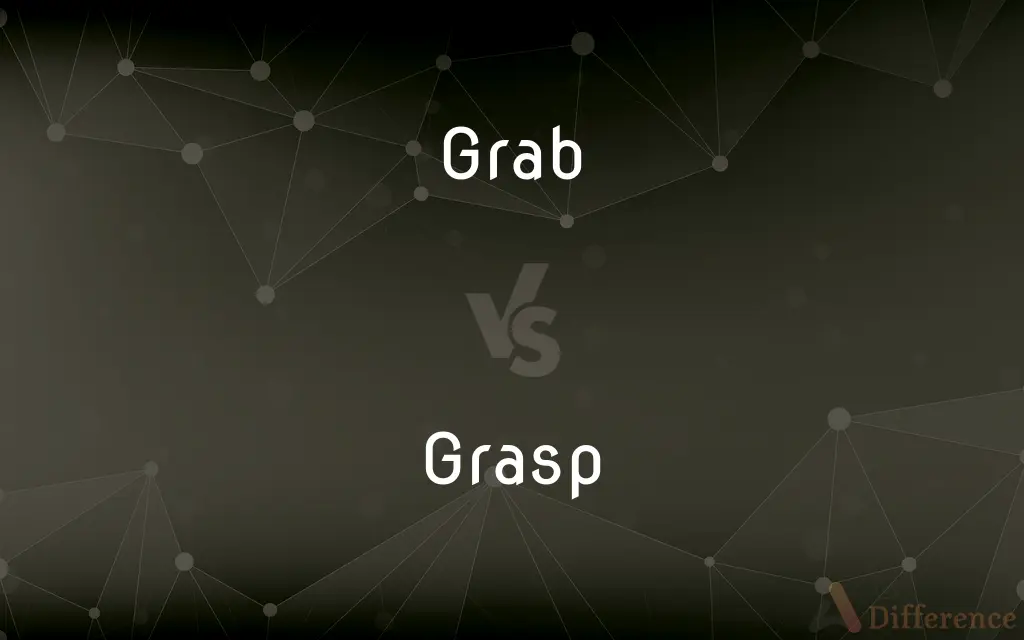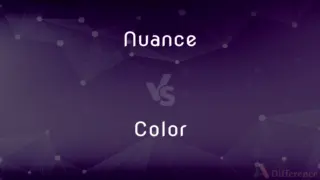Grab vs. Grasp — What's the Difference?
Edited by Tayyaba Rehman — By Maham Liaqat — Updated on April 1, 2024
"Grab" implies quickly seizing something with a sudden movement, often impulsively, while "grasp" denotes firmly holding or understanding something with intention.

Difference Between Grab and Grasp
Table of Contents
ADVERTISEMENT
Key Differences
To grab something is to quickly and often suddenly take or seize it in a hurried or eager manner. This action does not necessarily imply a firm hold or a deep understanding but rather a swift motion to acquire or capture something. Whereas, to grasp something means to hold it firmly or to comprehend it fully. The term conveys a stronger sense of control or understanding, suggesting not just physical holding but also mental acquisition.
When someone grabs an object, the focus is on the immediacy and speed of the action, often driven by instinct or a sudden desire. This can be seen in scenarios where quick reactions are required, such as grabbing a falling glass. On the other hand, when someone grasps an object, it implies a deliberate action, aiming for a secure and steady hold, reflecting a more measured and intentional approach.
In the context of understanding, to grab an idea suggests a preliminary, perhaps superficial understanding of it, perhaps in haste or without full comprehension. Whereas to grasp an idea indicates a deeper, more thorough understanding, implying that the concept has been fully comprehended and internalized.
The physical action of grabbing is often associated with a lack of elegance or finesse, possibly even implying desperation or urgency. In contrast, grasping is associated with competence and assurance, suggesting a methodical and secure approach, whether physically holding something or mentally understanding a concept.
In everyday language, "grab" might be used in more casual or urgent contexts, such as "grabbing a bite to eat" or "grabbing a seat," where the emphasis is on the action being quick and easy. Grasp, however, is often used in contexts requiring precision or depth, like "grasping the nuances of a language," where the focus is on the depth and completeness of the action or understanding.
ADVERTISEMENT
Comparison Chart
Primary Meaning
To quickly seize or take something
To firmly hold or understand something
Connotation
Suddenness, impulsiveness
Intentionality, control
Focus
Speed and immediacy of action
Firmness of hold or depth of understanding
Usage Context
Casual, urgent situations
Deliberate actions, comprehensive understanding
Associated With
Lack of finesse, potential urgency
Competence, assurance
Compare with Definitions
Grab
To take hold of something quickly without formality.
He grabbed his coat and rushed out the door.
Grasp
The ability to achieve comprehension or mastery.
The student's grasp of mathematics is impressive.
Grab
An act of taking or seizing swiftly.
Making a quick grab, she caught the ball before it could roll away.
Grasp
To reach for and hold something deliberately.
She grasped the opportunity to study abroad with both hands.
Grab
To capture or gain possession impulsively.
During the sale, shoppers grab anything they find at a discount.
Grasp
To take hold of something firmly with the hands.
She grasped the railing tightly as she climbed the steep stairs.
Grab
To attract or capture someone's attention quickly.
The movie's stunning visuals grab the viewer from the start.
Grasp
To understand something completely.
He grasps complex concepts more quickly than his peers.
Grab
To seize suddenly or hastily.
She managed to grab her phone just before it hit the ground.
Grasp
A grasp is an act of taking, holding or seizing firmly with (or as if with) the hand. An example of a grasp is the handshake, wherein two people grasp one of each other's like hands.
Grab
To take or grasp suddenly
Grabbed the letter from me.
Grasp
To take hold of or seize firmly with the hand, the foot, another body part, or an instrument
The elephant grasped the branch with its trunk.
Grab
To capture or restrain; arrest.
Grasp
To hold with the arms; embrace.
Grab
To obtain or appropriate unscrupulously or forcibly
Grab public funds.
Grab power.
Grasp
To take hold of intellectually; comprehend.
Grab
To take hurriedly
Grabbed my coat and hat and left.
Grasp
To make a motion of seizing, snatching, or clutching.
Grab
(Slang) To capture the attention of
A plot that grabs the reader.
Grasp
To show eager and prompt willingness or acceptance
Grasps at any opportunity.
Grab
To make a grasping or snatching motion
We grabbed for the life raft.
Grasp
The act of grasping.
Grab
A sudden attempt to grasp or hold something
Made a grab for the railing.
Grasp
A firm hold or grip.
Grab
A sudden, often unscrupulous taking control or ownership of something
"The imminence of death is reflected in every last power-stroke and grab of the great money bosses" (Dylan Thomas).
Grasp
An embrace.
Grab
A mechanical device for gripping an object.
Grasp
The ability or power to seize or attain; reach
Victory in the election was within her grasp.
Grab
A usually two-masted, sharp-prowed coastal vessel of the Indian Ocean.
Grasp
Understanding; comprehension
"only a vague intuitive grasp of the meaning of greatness in literature" (Gilbert Highet).
Grab
Relating or being an object or device that is grabbed or gripped for support or balance
Installed a grab bar in the shower.
Grasp
To grip; to take hold, particularly with the hand.
Grab
(transitive) To grip suddenly; to seize; to clutch.
I grabbed her hand to pull her back from the cliff edge.
Grasp
To understand.
I have never been able to grasp the concept of infinity.
Grab
(intransitive) To make a sudden grasping or clutching motion (at something).
The suspect suddenly broke free and grabbed at the policeman's gun.
Grasp
To take advantage of something, to seize, to jump at a chance.
Grab
To restrain someone; to arrest.
Grasp
Grip.
Grab
(transitive) To grip the attention of; to enthrall or interest.
How does that idea grab you?
Grasp
Understanding.
Grab
(informal) To quickly collect or retrieve.
Grasp
That which is accessible; that which is within one's reach or ability.
The goal is within my grasp.
Grab
(informal) To consume something quickly.
We'll just grab a sandwich and then we'll be on our way.
Is there time to grab a coffee?
Grasp
To seize and hold by clasping or embracing with the fingers or arms; to catch to take possession of.
Thy hand is made to grasp a palmer's staff.
Grab
To take the opportunity of.
Grasp
To lay hold of with the mind; to become thoroughly acquainted or conversant with; to comprehend.
Grab
(countable) A sudden snatch at something.
Grasp
To effect a grasp; to make the motion of grasping; to clutch; to struggle; to strive.
As one that grasped And tugged for life and was by strength subdued.
Grab
(countable) An acquisition by violent or unjust means.
Grasp
A gripe or seizure of the hand; a seizure by embrace, or infolding in the arms.
Grab
(countable) A mechanical device that grabs or clutches.
Grasp
Reach of the arms; hence, the power of seizing and holding; as, it was beyond his grasp.
Grab
A device for withdrawing drills, etc., from artesian and other wells that are drilled, bored, or driven.
Grasp
Forcible possession; hold.
The whole space that's in the tyrant's grasp.
Grab
A sound bite.
Grasp
Wide-reaching power of intellect to comprehend subjects and hold them under survey.
The foremost minds of the next . . . era were not, in power of grasp, equal to their predecessors.
Grab
(obsolete) That which is seized.
Grasp
The handle of a sword or of an oar.
Grab
(uncountable) A simple card game.
Grasp
Understanding of the nature or meaning or quality or magnitude of something;
He has a good grasp of accounting practices
Grab
A two- or three-masted vessel used on the Malabar coast.
Grasp
The limit of capability;
Within the compass of education
Grab
A vessel used on the Malabar coast, having two or three masts.
Grasp
A firm controlling influence;
They kept a firm grip on the two top priorities
He was in the grip of a powerful emotion
A terrible power had her in its grasp
Grab
A sudden grasp or seizure.
Grasp
The act of grasping;
He released his clasp on my arm
He has a strong grip for an old man
She kept a firm hold on the railing
Grab
An instrument for clutching objects for the purpose of raising them; - specially applied to devices for withdrawing drills, etc., from artesian and other wells that are drilled, bored, or driven.
Grasp
Hold firmly
Grab
To gripe suddenly; to seize; to snatch; to clutch.
Grasp
Get the meaning of something;
Do you comprehend the meaning of this letter?
Grab
A mechanical device for gripping an object
Grab
The act of catching an object with the hands;
Mays made the catch with his back to the plate
He made a grab for the ball before it landed
Martin's snatch at the bridle failed and the horse raced away
The infielder's snap and throw was a single motion
Grab
Take hold of so as to seize or restrain or stop the motion of;
Catch the ball!
Grab the elevator door!
Grab
Get hold of or seize quickly and easily;
I snapped up all the good buys during the garage sale
Grab
Make a grasping or snatching motion with the hand;
The passenger grabbed for the oxygen mask
Grab
Obtain illegally or unscrupulously;
Grab power
Grab
Take or grasp suddenly;
She grabbed the child's hand and ran out of the room
Grab
Capture the attention or imagination of;
This story will grab you
The movie seized my imagination
Common Curiosities
Can grab and grasp be used interchangeably?
While sometimes used interchangeably in casual speech, they have distinct nuances, with "grab" implying quick action and "grasp" denoting firmness or comprehension.
What does it mean to grab someone's attention?
It means to quickly capture or attract someone's interest or focus.
Can a person grasp something immediately?
Yes, but in the context of understanding, it suggests quickly coming to a thorough understanding, rather than a superficial or hurried one.
What is the main difference between grab and grasp?
"Grab" focuses on quickly seizing something, often impulsively, while "grasp" implies a firm hold or deep understanding.
Is grabbing considered rude?
In some contexts, grabbing can be seen as impolite or aggressive, depending on the action and cultural norms.
Why might someone prefer to grab rather than grasp?
In situations requiring quick action or when immediate control isn’t necessary, grabbing might be more practical or urgent.
Can grasp have a negative connotation?
Not typically; it usually conveys a positive sense of control or understanding.
Is grasping always physical?
No, grasping can also refer to understanding concepts fully, not just physically holding something.
How does one demonstrate a grasp of a subject?
Through demonstrating comprehensive understanding or skill in that area, often via explanation, application, or teaching.
Is it better to grab or grasp an opportunity?
Grasping an opportunity implies not only seizing it but also fully utilizing and understanding it, which is generally seen as more thoughtful and thorough than simply grabbing it.
How do physical actions of grab and grasp differ?
Grabbing is a quick action, often without much care for how firmly or securely something is held. Grasping is more deliberate, ensuring a secure or firm hold.
How do grab and grasp relate to learning?
In learning, grabbing might refer to quickly picking up a piece of information, while grasping implies fully understanding or mastering it.
Can animals grasp or grab?
Yes, many animals can grab or grasp with their limbs, mouths, or other body parts, depending on the context and physical ability.
Can grab and grasp be used in digital contexts?
Yes, both terms can be metaphorically used in digital contexts, such as "grabbing" (quickly obtaining) data or "grasping" (fully understanding) digital concepts.
Is there a psychological difference between grab and grasp in terms of desire or need?
Grabbing might be driven by an immediate desire or need, sometimes impulsively. Grasping, especially in metaphorical sense, suggests a more considered or intentional effort.
Share Your Discovery

Previous Comparison
Beauty vs. Beautiful
Next Comparison
Nuance vs. ColorAuthor Spotlight
Written by
Maham LiaqatEdited by
Tayyaba RehmanTayyaba Rehman is a distinguished writer, currently serving as a primary contributor to askdifference.com. As a researcher in semantics and etymology, Tayyaba's passion for the complexity of languages and their distinctions has found a perfect home on the platform. Tayyaba delves into the intricacies of language, distinguishing between commonly confused words and phrases, thereby providing clarity for readers worldwide.














































